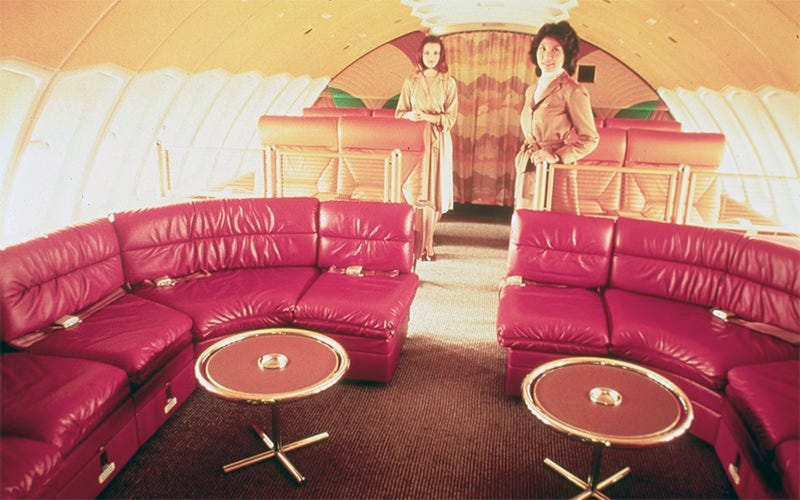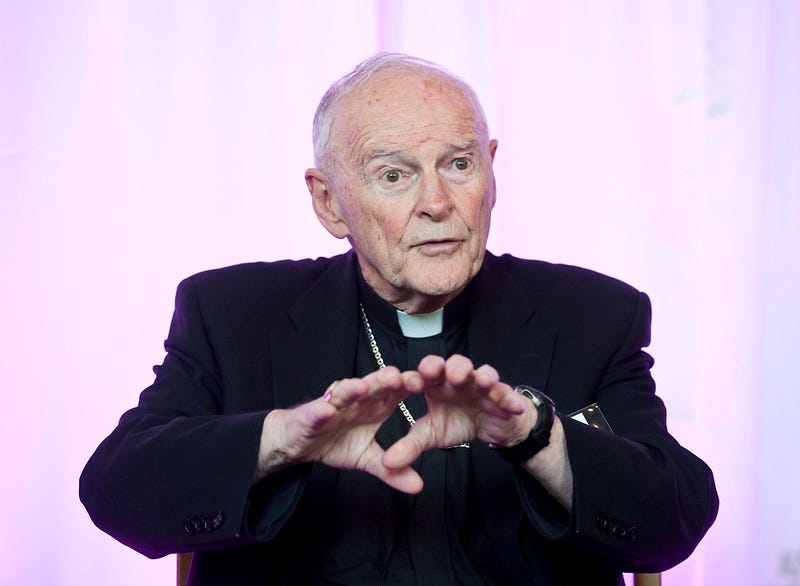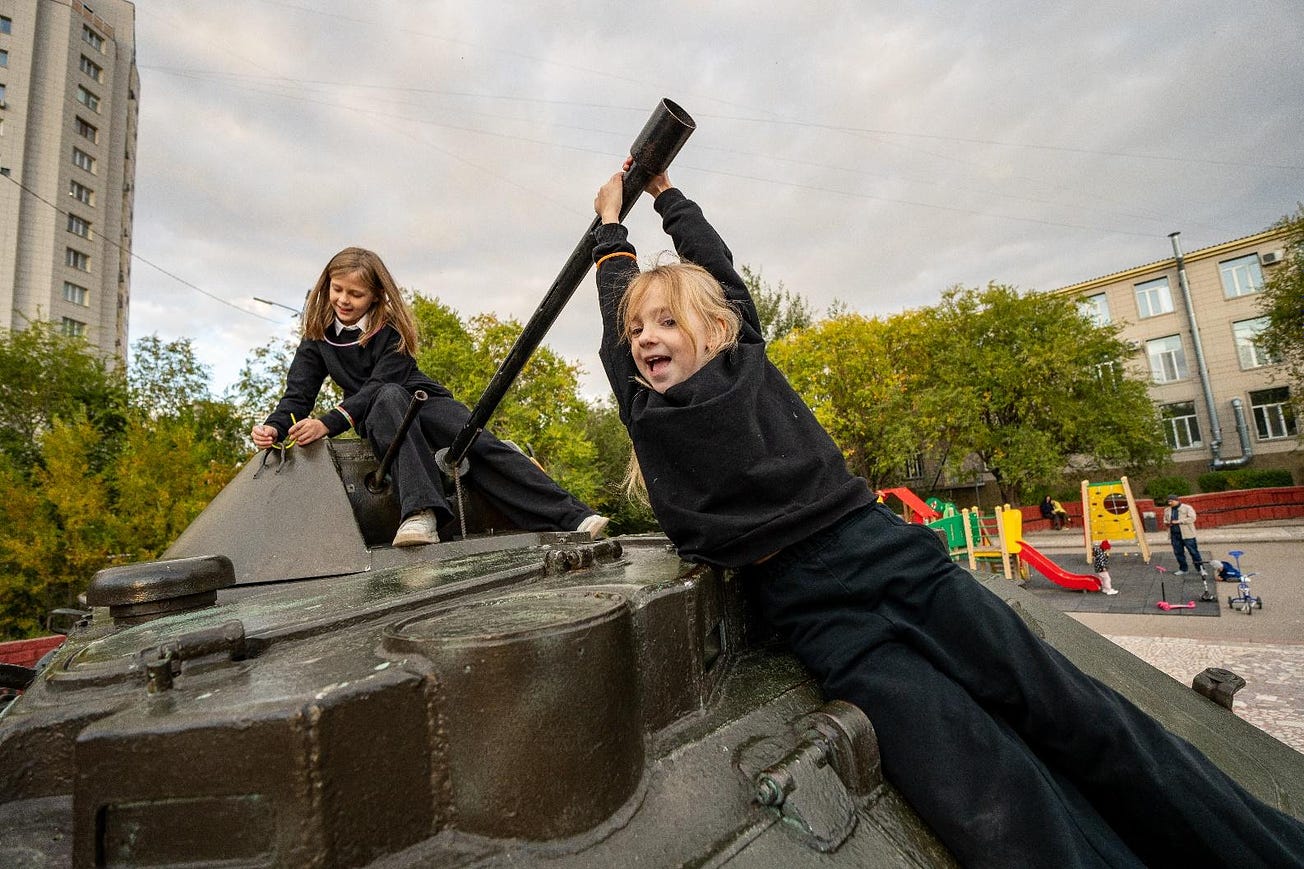Pillar subscribers can listen to Ed read this Pillar Post here: The Pillar TL;DR
Happy Friday friends,
And a glorious feast of All Saints to you all.
Halloween yesterday was something of an odd event for us in our house.
My wife, being a Londoner, takes an outsider’s view of the whole affair, generally treating it with skepticism but open to anything involving our kid dressing up.
I, on the other hand, spent the first 10 years of my life living in a John Hughes movie, so my childhood memories of the night are vivid and cinematic and fermented in decades of nostalgia from living abroad.
Our daughter is barely three years old, so this was her first outing with any real sense of what’s going on. She liked the costume and, like all little girls, accepted the compliments of everyone with great condescension.
But she wasn’t entirely clear on the mechanics of bowling up to strangers’ front doors, knocking hard and being greeted with enthusiasm — she’s half English, you see, and that sort of behavior just doesn’t wash over there.
Several years ago my wife installed a doormat that says simply “GO AWAY,” which we thought hysterically funny, but has caused more than one invited guest to pause.
But our kid made a game go of it. And she is faultlessly polite, though easily confused.
After correctly reciting the trick-or-treat mantra, she’d receive what was offered, put it in her little bag, then she would remember her manners and hand it back with a ‘Thank you!’
Her haul was rather meager, as you might imagine. And nothing would persuade her that Swedish Fish are food, not plastic toys — she may be right about that.
I’d say it was a modest first effort. We’ll see how we go next year.
Looking ahead, a date for your diary if you are in the Washington area:
As some of you know, JD and I traditionally do a dive bar live show of the podcast every year from Fells Point in Baltimore, to coincide with the USCCB Fall Assembly.
While we’ll still be in Baltimore for the bishops’ meeting — and drinking in the same Fells Point bar — this year we’re taking the live show down I-95 to DC.
By “popular demand,” and I’m using that term very elastically, we’ll be making a live episode of The Pillar Podcast at Royal Sands Social Club on Thursday, November 14, from 7pm.
Yes, “Royal Sands Social Club” sounds like a Vegas casino and that makes me nervous, but we are all just going to hold hands and jump together into the unknown here. Pillar people are the best people and these live show nights are always a fantastic time. I am sincerely looking forward to it, and hope you can make it.
Now, here’s the news.
The News
The pope’s safeguarding commission released its long-awaited first annual report this week on the Catholic Church’s efforts to combat abuse worldwide.
The Pontifical Commission for the Protection of Minors (PCPM) issued the 98-page Annual Report on Church Policies and Procedures for Safeguarding Oct. 29, exactly two and a half years after Pope Francis publicly requested it.
The report is couched in diplomatic language, but offers a fairly pointed critique of the state of safeguarding in the Church today:
“The commission found a persistent concern regarding the transparency in the Roman Curia’s procedures and juridical processes,” the report said. “The commission notes that this will continue to foment distrust among the faithful, especially the victim/survivor community.”
Read all about the report, and what it said, right here.
—
The tribunal of Vatican City this week published the full verdict in the landmark financial crimes trial which concluded last year.
The more than 800-page document lays out the judicial reasoning for the conviction of nine defendants, including Pillar reader Cardinal Angelo Becciu, in December last year, as well as the evidence on which those convictions were based.
The depositing of the full decision now clears the way for the appeals process to begin, with lawyers for the various defendants expected to file their arguments against the judges’ rationales in the coming weeks.
—
Speaking of Pillar reader Cardinal Angelo Becciu, the former papal chief of staff was back in the news this week following the broadcast of a series of interviews filmed over several years with Belgian TV.
In addition to addressing his… controversial involvement in funneling ecclesiastical funds into his brother’s personal bank account, Becciu also addressed what he sees as the problems raised by Pope Francis’ exercise of papal authority.
Becciu was pretty blunt in his assessment, and in his recommendations: “It will be necessary to clarify the exercise of papal authority,” he said. “That is, he should no longer be a head of state.”
That’s not a recommendation likely to find much favor with his brother cardinals, many of whom will find it a bit rich coming from someone convicted of abusing his own office.
Read all about the interview here.
—
Eight deacons are due to be ordained as priests in India’s Archeparchy of Ernakulam-Angamaly Monday, following an almost year-long delay.
The eight men were originally scheduled to be ordained to the priesthood in December 2023, but the ceremony was postponed after it became enmeshed in the Syro-Malabar Catholic Church’s liturgy dispute.
The ordinations will now take place Nov. 4 at Thrikkakara minor seminary in India’s southern Kerala state, the heartland of the Syro-Malabar Church, the second-largest of the 23 Eastern Catholic Churches in full communion with the pope.
Get the whole story, and the background — which as ever is fascinating — right here.
—
The Archdiocese of Chicago has dispensed Catholics from the obligation to attend Mass this year on the Solemnity of the Immaculate Conception, which falls in 2024 on Monday, Dec. 9.
The dispensation comes after a Vatican clarification last month that the December solemnity — which usually takes place on Dec. 8 — should be regarded in the U.S. as a day of obligation even in years when its observation is moved to Dec. 9, despite prior practice to the contrary.
With an unusual circumstance regarding a fast-approaching liturgical solemnity — and believe me it is very unusual — other U.S. dioceses have done the same already, with more likely to follow the dispensation offered in Chicago.
You can read all about it right here.
Court report
If I am being honest with you, I am only about a third of the way through a careful reading of the full judicial decision in the financial crimes trial. It’s just a whisper over 750 pages, more than 800 if you include the indices, and my Italian legalese is workable, at best.
That being said, there’s every reason to expect I shall have plenty of time to sift through the text carefully.
It seems vanishingly unlikely that defense lawyers will be expected to get their substantive appeal briefs in for at least a month, and the judges would need at least as long again to read and digest them before setting a date for a preliminary hearing.
What happens then, though, and at what pace, is anyone’s guess.
If I had to bet, I would put my money on the appeal court judges splitting the ticket of defendants, drawing a distinction between those who have real, substantive legal arguments to make before the court, and those against whom the evidence is overwhelming and the case for review marginal, at best.
If you ask me, some defendants, like Gianluigi Torzi, might find their bid for a second hearing bounced back altogether, while others like Raffaele Mincione might find the judges are at least willing to give them a chance to make their case.
Of course, the real question will be what the judges do with Pillar reader Cardinal Angelo Becciu.
Leafing through the full verdict this week, I was struck by how narrowly the judges moved to convict the cardinal — appearing to carefully segregate their findings and the evidence supporting them from the more lurid and soap opera-esque aspects of the case, and closing off any real hope for him at appeal.
For example, Becciu has repeatedly claimed he is the target of a revenge and smear campaign chiefly carried out by and through his former deputy, Msgr. Alberto Perlasca.
But the judges had no problem chucking out Perlasca’s testimony as “devoid of independent probative relevance for the purposes of this trial,” and moving to convict Becciu on the strength of factual proof of admitted actions by the cardinal — like sending thousands and thousands of Church funds to his brother’s personal bank account.
The nightmare for Becciu is if the appellate court accepts to hear his arguments against some of his convictions but not others. In that case, he could be left fighting to explain complicated and probably deeply unflattering patterns of behavior in office all over again, even while knowing his conviction on other charges is basically locked in.
For the former sostituto, his appeal is, it seems to me, an all-or-nothing prospect. While his supporters — and he does have them — will spin any reduction in his litany of convictions and years of prison sentences as a kind of vindication, such a result will likely matter little to Becciu himself.
Put simply, either he is exonerated entirely or he is sent to prison for any amount of time. There is not a lot of room between those results for the cardinal.
And, again looking at the narrowness of the judicial reasoning in this week’s full decision, it seems to me like the Vatican City judges have done their best to minimize the cardinal’s room for legal maneuver at appeal.
The extent to which this view is shared around the Vatican, including Becciu’s former department of the Secretariat of State, will likely be seen in the coming weeks, when the former auditor general Libero Milone’s appeal is heard by the same appellate court.
Milone is suing for wrongful dismissal over Becciu’s role in turfing him out of office under threat of criminal prosecution in 2017. While the suit was thrown out at first instance, the real sticking point in the legal arguments was not if Milone had been badly used but who, if anyone, could legally be held to account for what was done to him.
Lawyers for the Secretariat of State have so far argued successfully that Becciu’s actions could be construed as papal acts by delegation, and thus beyond legal appeal.
But if a new consensus emerges that the cardinal is now an established criminal actor and abuser of his office, the appeal court might find a way to vindicate Milone at Becciu’s expense, without implicating Pope Francis or admitting institutional liability by the Vatican.
Watch that space.
Flyaway home
On my return from Rome last week, I was struck, as I often am, by the national scandal that is Washington-Dulles airport.
If our capital city was famously laid out to inspire awe in visiting dignitaries and to project the strength of a young country’s neoclassical imperial pretensions, it seems to me that its major international terminus must have been equally deliberately conceived to impress the opposite upon new arrivals.
I’ve flown into some pretty varied capital cities over the years, and only in America are new arrivals subjected to the indignity and inconvenience of disembarking their plane only to be lined back up like cattle and herded onto a series of scissor-lift shuttle buses to be taken to the main terminal building, where the average efficiency and enthusiasm of immigration officials appears to operate in direct correlation to the number of them actually at their posts — perpetually hovering just above zero — and would shame the administration of Ellis Island.
It baffles me how an entire series of buildings — interlinked by ground transportation and constructed at least half a story off the ground — can so perfectly preserve the feeling of being trapped underground, yet Dulles manages it remarkably effectively.
The state of the place is even more shocking, and shameful, when one is flying in from Rome, where the international terminal is an actual pleasure to spend time. Indeed, Fiumicino is almost equally paradoxical in its relationship to Rome as Dulles is to DC.
Love it as I do, the Italian capital is largely crumbling, sclerotic, overcrowded and unnavigable, smelling faintly of fried food, wet stone, new leather, and dog crap. The local airport is in turn spacious, thoughtfully laid out, efficient and clean.
Most of all, Fiumicino gives you access to real food — food made by real humans intended for consumption by real humans. I cannot understand how Rome alone thought to include a proper fresh deli into their concourse, from which you can lay in any necessary provisions for your flight.
One of my absolute iron-clad rules of international travel is never — never — eat airplane meals. Doing so is a kind of surrender of the spirit, an acceptance of bovine status as you meekly masticate whatever subhuman slop the surly staff shove in front of you, which I am convinced is mostly made up of salt and sedatives.
It’s bad for you, body and soul.
Of course, air travel used to be very different.
I sometimes see those pictures from the 1970s, in which coach class seems to hover somewhere in between a Sunday lunch buffet and a Persian nightclub.

I never got to experience those days, though I would gladly trade modern inflight movies and wifi for what the pictures appear to promise.
I am, though, just old enough to remember (and once to have taken) a flight on which you could still smoke, something we should all rue the loss of.
Now don’t get me wrong, I am not in favor of anyone anywhere on the plane being able to light up willy-nilly — people bring children on planes, after all. One shouldn’t smoke in front of kids if you aren’t prepared to share with them, any more than one should bust out a chocolate cake and force them to watch you eat the whole thing.
There is, however, a compelling argument for allowing a fun-filled, consenting adults smoking section at the back of the plane.
The common fallacy is that smoking was banned on planes because of health concerns — in reality, airlines welcomed the move for economic reasons.
When people could light up in-flight, all the air in the plane cabin had to be totally replaced with fresh air from outside every three minutes. Once the airlines banned smoking, however, it became totally kosher to simply recycle the air throughout the whole flight, adding a bit of 02 and only mixing in a bare minimum of new air from outside — rarely enough to replace all the air even once over the course of a flight.
This had the effect of shooting cabin CO2 levels through the roof — which is why and when Deep Vein Thrombosis suddenly became a thing on long-haul flights — but saved the airlines about 6% on their fuel costs per trip.
In 1997, when total bans were becoming the norm, it was estimated that major airlines were saving in the region of $100 million a year each thanks to smoking bans sparing them the need to pump fresh air into their planes.
Of course, the counter-argument to all this is that while the food is poison, the seats are like veal crates, and the air is unbreathable, flying has become cheaper, opening international travel up to many more people in the process.
I think this is what’s commonly called “democratizing” something, in the sense that it broadens availability to everyone.
Though, without straying into election-cycle commentary here, I would say it’s a hell of a thing to say about the democratic process if we invoke it to mean making something uglier, less comfortable, and more unhealthy for all concerned, in the name of universal access.
I thought that was socialism.
See you next week,
Ed. Condon
Editor
The Pillar






